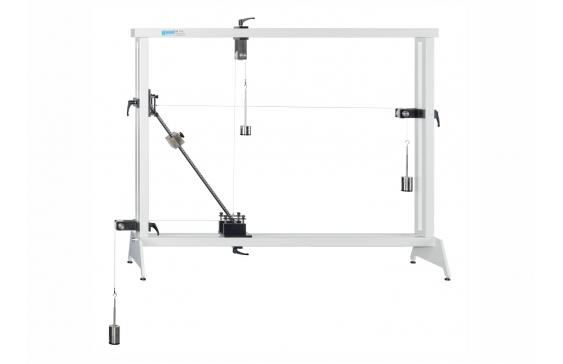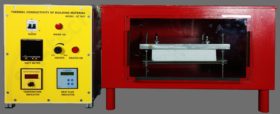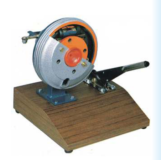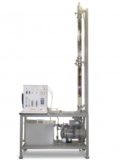Equilibrium in a Single Plane Apparatus Model MT 109
Home » Products » Equilibrium in a Single Plane Apparatus Model MT 109
Equilibrium in a Single Plane Apparatus Model MT 109
The principle of “freeing” in engineering mechanics allows forces and moments acting on a body to be made visible. In this process, a body or a system such as a bar are virtually removed from the environment. All forces acting on the body or on the system are replaced by standardized symbols. This results in a simplified model of the body or system, which clearly demonstrates the relationships between forces and moments. In the experiment with Sci-tech Equilibrium in a Single Plane Apparatus Model MT 109, we demonstrate the principle of “freeing”, which refers to establishing static equilibrium. The experiment uses a model of a ladder with a sliding clamp weight. The top support is designed as a movable support and the bottom one as a fixed support. The real effective support forces can be fully compensated by applying cable forces in the x and y directions. The ladder is in a state of equilibrium without changing the angular position and without the need for structural support. The ladder is “free”. For students, the result is a convincing example for the principle of “freeing” in statics. The parts of the experiment are clearly laid out and securely housed in a storage system. The entire experimental setup is constructed in the mounting frame.
| Size: | 110cm x 40cm x 95cm (LxWxH) |
| Weight: | 15 kg |
Item Description
The principle of “freeing” in engineering mechanics allows forces and moments acting on a body to be made visible. In this process, a body or a system such as a bar are virtually removed from the environment. All forces acting on the body or on the system are replaced by standardized symbols. This results in a simplified model of the body or system, which clearly demonstrates the relationships between forces and moments.
In the experiment with Sci-tech Equilibrium in a Single Plane Apparatus Model MT 109, we demonstrate the principle of “freeing”, which refers to establishing static equilibrium. The experiment uses a model of a ladder with a sliding clamp weight.
The top support is designed as a movable support and the bottom one as a fixed support. The real effective support forces can be fully compensated by applying cable forces in the x and y directions.
The ladder is in a state of equilibrium without changing the angular position and without the need for structural support. The ladder is “free”. For students, the result is a convincing example for the principle of “freeing” in statics.
The parts of the experiment are clearly laid out and securely housed in a storage system. The entire experimental setup is constructed in the mounting frame.
Technical Specifications
Specifications
- Development of the static principle of “freeing”
- Full compensation of the support forces by cable forces
- Sliding clamp weight
- Determine the position of the clamp weight via steel rule with millimetre scale
- 2 supports (1x fixed support, 1x movable support)
- 3 guide pulleys
- Storage system for parts
- Experiment setup in the mounting frame
Technical Specifications
Ladder
- length: 650mm
- weight: 2N
- built-in rule, graduation: 1mm
Clamp weight: 20N
Weights
- 3x 1N (hanger)
- 9x 5N
- 12x 1N
Supports
- 2, clamped to mounting frame
Steel rule
- length: 1000mm, graduation: 1mm
Experiments
- Experimental development of the core principle of “freeing” in statics
- Calculation of the support forces for a given position of the clamp weight and for a known angle of inclination
- Application of the 1stand 2nd equilibrium conditions in statics and full compensation of the support forces by cable forces
- How does the clamp weight position affect the support forces
- How the angle of inclination affects the support forces
Model Number
MT 109




